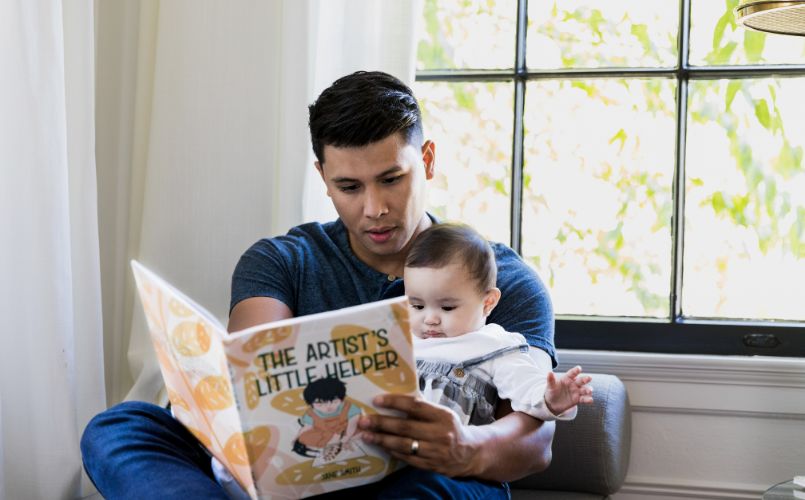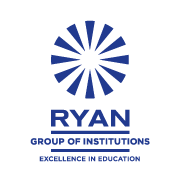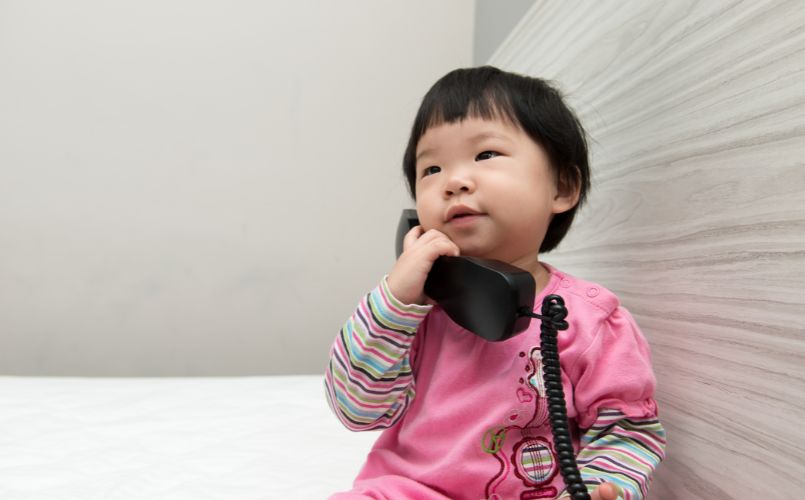Language development & early literacy are crucial in the formative years of a child’s life. As parents, realising the significance of these developmental stages & knowing how to effectively support them can have a profound impact on a child’s future communication skills & academic success.
From the moment they are born, children are hardwired to learn language & absorb the nuances of communication. The role of parents in this learning journey is paramount. By actively participating in their child’s language development, parents not only strengthen the bond with their child but also lay a solid foundation for their linguistic & cognitive growth. The strategies discussed here include reading to children, engaging them in conversation, & incorporating various language-enhancing activities into their daily routine.
Reading to children is more than a bedtime ritual; it is a gateway to a world of words, ideas, & imagination. When parents read to their toddlers, they expose them to a rich vocabulary, varied sentence structures, & the rhythms of language. This exposure is crucial for developing strong reading skills later in life. Moreover, interactive reading – where parents encourage children to ask questions, predict outcomes, & express opinions about the story – further enhances comprehension & critical thinking skills.
Conversations with toddlers might seem one-sided at times, but they are instrumental in developing their speaking & listening skills. Simple, everyday interactions – describing what you are doing, asking questions about their environment, & narrating experiences – can significantly boost a child’s vocabulary & language accumen. These conversations lay the groundwork for effective communication skills, crucial for personal & professional success in later years.
In addition to reading & conversation, engaging toddlers in language-rich activities plays an important role in their linguistic development. Activities like singing, playing word games, & storytelling stimulate language acquisition in a fun & interactive way. These activities not only enhance a child’s vocabulary but also improve their ability to express themselves clearly & confidently.
The Power of Reading to Children

Reading to children, especially toddlers, is more than an enjoyable pastime; it’s an instrumental tool in shaping their language development & early literacy skills. When parents read to their children, they provide a window into the vast world of language, exposing them to new vocabulary, sentence structures, & the varied rhythms of written & spoken words. This exposure is not just entertaining; it is fundamental to their future linguistic proficiency & love for reading.
The benefits of reading to toddlers are backed by numerous studies. Research has consistently shown that children who are read to from a young age have a larger vocabulary, better language skills, & a higher aptitude for learning in later stages. It’s not just about the words they hear, but also about the interaction that occurs during reading time. This interaction is a crucial element of their social & emotional development.
Choosing the right books is the key. Books for toddlers should be age-appropriate, engaging, & rich in language & illustrations. Picture books with vibrant images & simple yet imaginative stories capture the attention of young minds, encouraging curiosity & a love for stories. Interactive books that invite participation, such as those with flaps to lift or textures to feel further enrich the reading experience, making it more immersive & enjoyable experience.
It’s important for parents to be interactive during reading sessions. This means not just reading the words on the page, but also discussing the story, asking questions, & encouraging the child to predict what might happen next. For instance, pausing to ask, “What do you think the bunny will do now?” or “Can you find the red apple?” turns reading into a two-way conversation that boosts comprehension & critical thinking.
Moreover, reading aloud models fluent reading, helping children recognize how language is used & heard. Expressive reading, where parents use different voices for characters & vary their tone & pace, makes the story come alive. This not only makes reading more fun but also helps children have a grip at emotional context & nuances of language.
Through reading, children learn that words convey meanings, stories tell about life, & books are treasures that hold endless knowledge & joy. This awareness lays the groundwork for their academic journey, making them not just ready to learn but eager to explore the world of books & language.
Enhancing Language Skills through Conversation

The art of conversation plays a pivotal role in enhancing language skills in toddlers. Engaging in regular, meaningful dialogue with young children is not just about teaching them new words; it’s about fostering an environment where language can flourish. Conversations are the groundwork upon which children build their perception of the world & how to communicate within it.
From a developmental perspective, the benefits of talking to toddlers are immense. Studies highlight that children whose parents frequently talk to them from an early age develop larger vocabularies, better grammar, & stronger linguistic skills. This frequent, quality interaction is a key predictor of future academic success & social skills.
But how do parents turn everyday moments into language-enhancing opportunities? It starts with being present & attentive. Whether it’s during mealtime, playtime, or a routine activity, every moment is an opportunity for dialogue. Describing actions, expressing thoughts, & narrating experiences enrich a child’s linguistic environment. For instance, a simple walk in the park becomes a language lesson when a parent points out the chirping birds, the green trees, & the softness of the grass.
Questions are a powerful tool in these interactions. By asking open-ended questions, parents encourage their toddlers to think & express themselves. Questions like “What do you think will happen next?” or “Why do you think the character is happy?” stimulate critical thinking & foster conversational skills. Moreover, responding to a child’s often repetitive questions with patience & enthusiasm not only satisfies their curiosity but also shows them the value of communication.
Listening is as important as speaking. When parents actively listen to their child’s babbling, stories, or questions, & respond appropriately, they validate their child’s thoughts & feelings. This validation is crucial for building self-esteem & communication skills. It tells the child that their words matter, encouraging them to communicate more.
Through these simple yet impactful conversational practices, parents lay the foundation for effective communication, a skill that will serve their children well throughout life. Language is not just about words; it’s about expressing ideas, sharing feelings, & connecting with others. By conversing with their toddlers, parents are doing more than teaching language; they are opening doors to a world of expression & knowledge.
Activities That Promote Language Acquisition
Beyond reading & conversation, there is a plethora of activities that can significantly contribute to a toddler’s language development. These activities, infused with fun & interaction, not only engage a child’s mind but also enhance their language acquisition in a natural & enjoyable manner. From singing & storytelling to word games, each activity is a building block in the child’s linguistic journey.
Singing is a delightful way to introduce new words & concepts. Children’s songs, with their repetitive & rhythmic nature, are excellent tools for language development. They enhance memory, phonemic awareness, & vocabulary. Singing songs like “The Wheels on the Bus” or “Old MacDonald Had a Farm” introduces toddlers to a range of words & sounds in an engaging, memorable way. Additionally, actions accompanying the songs help in underst&ing the meaning of the words, making it a multi-sensory learning experience.
Storytelling, another powerful tool, sparks imagination & strengthens narrative skills. Unlike reading from a book, storytelling allows for more creativity & interaction. Parents can create stories with their child, encouraging them to add characters or decide what happens next. This not only enhances their vocabulary & sentence structure but also fosters creativity & critical thinking.
Word games & language-based activities are equally important. Simple games like “I Spy” help in building vocabulary & mastering the concepts. For instance, “I Spy something red” can start a fun & educational search for red objects, teaching colors & new words. Puzzle games & sorting activities also contribute to cognitive development & language skills, as they involve naming objects, describing actions, & solving problems.
Imbibing these activities into a child’s daily routine is key. They don’t have to be scheduled or structured; rather, they should be spontaneous & fun, seamlessly integrated into everyday life. For example, a grocery shopping trip can turn into a vocabulary lesson as parents & children name the fruits & vegetables or describe their colors & shapes.
By adopting these varied activities, parents can create a rich, language-enhanced environment for their children. Each activity, in its own unique way, contributes to the child’s knowledge & use of language. The goal is not just to teach words, but to open up a world where language is a key to learning, expression, & creativity.
Stimulating language development & early literacy in toddlers is an enriching & rewarding experience for both the child & the parent. Through the simple yet impactful activities of reading, conversing, & engaging in language-rich activities, parents can lay a strong foundation for their child’s linguistic & cognitive development. This foundation is not just about acquiring language skills; it’s about fostering a love for learning, communication, & creativity.
As we have explored, reading to children opens up a world of imagination & knowledge, while enhancing their vocabulary & comprehension. Conversations, on the other hand, build critical thinking & social skills, making children effective communicators. Activities like singing, storytelling, & playing word games not only make learning fun but also reinforce language skills in a practical & engaging manner. These activities, intertwined with the child’s daily life, create a natural & stimulating environment for language acquisition.
It’s important for parents to remember that every child’s language development journey is unique. Some children may pick up words quickly, while others may take more time. The key is patience, encouragement, & consistency. Celebrating small milestones, being responsive to the child’s efforts to communicate, & providing a learning environment is crucial components of this journey.
The role of parents in facilitating language development & early literacy is invaluable. By incorporating these strategies into their daily interactions with their children, parents can provide the necessary support & stimulation for their child’s growth & development. This journey, filled with words, stories, & conversations, is one that will set their child on the path to a lifelong love for language & learning.




